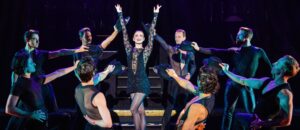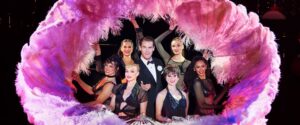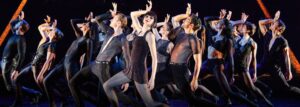CHICAGO – The Pantages Hollywood – Amanda Callas Review
Chicago is a slinky, sensual, genderqueer, minimal production of the smash hit 1975 classic musical at the Pantages Theatre in Hollywood. The mood of the show is sexy, Brechtian, and cynical. Chicago darkly satirizes the justice and prison system, showbusiness, journalism, and America’s national obsession with true crime, redemption, and fame. In an era of constant noise, social media stardom, and a collapsing, nakedly partisan media cannibalizing itself in an endless gladiatorial spectacle for clicks and diminishing viewership, the satire feels even more relevant and sharp than ever.
Chicago is the longest running American musical on Broadway. And seeing this production at the ever glorious historic Pantages Theatre, it is not hard to see why. The music by classic Broadway songwriting wizards John Kander and Fred Ebb ( Cabaret, Kiss of the Spider Woman, Funny Lady) is sheer perfection, and the dance numbers are dazzling, virtuosic, and wickedly seductive. The audience at the Pantages on the night I attended was ecstatic.

Hedonistic and kinky, with an orgiastic, pansexual vibe, the choreography by Gregory Butler (based on the original direction by Walter Bobbie and original choreography by Ann Reinking, and before that, Bob Fosse) is technically extraordinary, sensual, and provocative. The classic showstopper “Cell Block Tango “sizzles on the stage, with the unrepentant, fed-up murderesses stretching and pacing like tigers. It is one of those glorious numbers that you have to see live to truly experience. Cait Zuckerman as Liz / “Pop” stands out in the terrific lineup for her ferocity, pitch perfect timing and dark humor.
The male dancers are surprisingly even more sexualized than the female dancers, stroking and jiggling their goods for the audience, to much thunderous and raucous applause. Roxie’s boy toy Fred Casely is a teeny tiny blip of a part, but Parisian actor and dancer Ed Gotthelf makes it into an utter star turn, preening and prancing and counting his ab muscles, equal parts delicious, self-deprecating humor and leonine self-luxuriating. His dancing is inventive, technically flawless and sublime.
This is a very minimal, black box style production, with scenic design by John Lee Beatty. The live orchestra takes up most of the stage, with very little in the way of props or backdrops or costume changes. It is striking and seductive and edgy in a lean, fresh way. Yet after recently seeing a delightful production of Aladdin at the Pantages, I miss some of the lavishness and spectacle of a more traditionally produced show. The costumes especially feel like a lost opportunity. Costuming by William Ivey Long is bare, almost all black, with mesh shirts and slinky vests and bulging trousers for men and lingerie and little black dresses for women. I think this style of revival for Chicago has been popular for quite some time, leaning away from both the 1920s setting and the vaudeville homage of the original musical. Kander, Ebb, and Fosse leaned heavily into vaudeville while creating Chicago, styling the different numbers based on legendary vaudeville performers, while also drawing on the original Watkins play.

Screenshot
In 1924 Chicago journalist Maurine Dallas Watkins covered the trials of several infamous murderesses in her column. They became instantly sensational and wildly popular. Watkins wrote a fictional play based on the real life trials that was later adapted into a silent Cecil B. DeMille film and a 1940s Ginger Rogers vehicle. Gwen Verdon, Broadway actress and dancer, read Watkins’ play and recommended it to her husband, director and choreographer Bob Fosse. After a battle to get the rights, Kander, Ebb, and Fosse wove in elements of Jazz Age decadence and crime, 1970s cynicism and hedonism, and a tribute to classic, beloved vaudeville stars to create something truly spellbinding, a musical that has been bedazzling audiences for half a century now.
The 2002 Academy Award winning film, probably a point of comparison for many, works better in some ways, enriching the narrative, deepening the characters, giving us some tonal respite from the cynicism, and creating a rich, sparky chemistry between frenemy leads Velma and Roxie. At its worst moments, this production directed by David Hyslop can feel a little glib, cold, and brittle, with a cynicism and snappy scornfulness that never lets up. It can feel like being stuck in a room for three hours with a pornography-addicted middle school student questioning their gender and sexuality, while convinced that they are smarter than everyone and that everything is a joke.
It can be a challenge to find the humanity, vulnerability, and soul of Chicago, and this production leans more into indulgent decadence and chilly dazzle than it does heart. Yet this Broadway staging has many unique and compelling pleasures, among them, astonishing, gorgeous choreography, and stunning vocals and music. The live orchestra directed and conducted by Cameron Blake Kinnear is absolutely fantastic.
Katie Frieden is a terrific actress with a powerhouse voice and beguiling movement. At times, her crystalline beauty, dismissive sarcasm and metallic, hard-driving perfection can make her feel a little miscast. Surely if Frieden were living in 1920s Chicago, she would already be a triumphant stage diva and not the lost, wannabe Jazz Age singer and mechanic’s wife Roxie Hart. Nonetheless, Kate Frieden’s numbers are some of the most engaging and compelling in the show. “Roxie” brings down the house.

Screenshot
Non-binary trans Canadian performer Kailin Brown brings lithe, impressive dancer’s athleticism and coltish gracefulness to flapper girl Velma Kelly. “I Can’t Do It Alone” defies belief with virtuosic, acrobatic showmanship. Audience favorite Connor Sullivan commands the stage as Billy Flynn, with impressive vocals and confident charisma.
As I mentioned in my review of Aladdin, the Pantages is an opulent Art Deco palace and original home of the Oscars. It is a spectacular landmark theatre, one-of-a-kind, awe-inspiring and transportive. Seeing Chicago here is more than seeing a play. On the night I attended, the rain came down relentlessly. It produced a kind of enchantment, making all the neon of Hollywood Boulevard glow. The stars on the sidewalks shone wet and iridescent- forgotten names, reality TV actors, and modern superstars alike. I held my umbrella out for a second to linger over old Hollywood legends Bette Davis and Loretta Young, their names crushed under the soles of passerby. It is hard to think of a more fitting place to see a musical about the vagaries of fame than here.
Chicago plays at Hollywood Pantages Theatre March 5-24 2024.
Performances throughout the week.
Tickets start at $39.
Ticketing: https://www.broadwayinhollywood.com/events/detail/chicago
You can also call (323) 468-1770.
Street parking with many nearby paid lots.